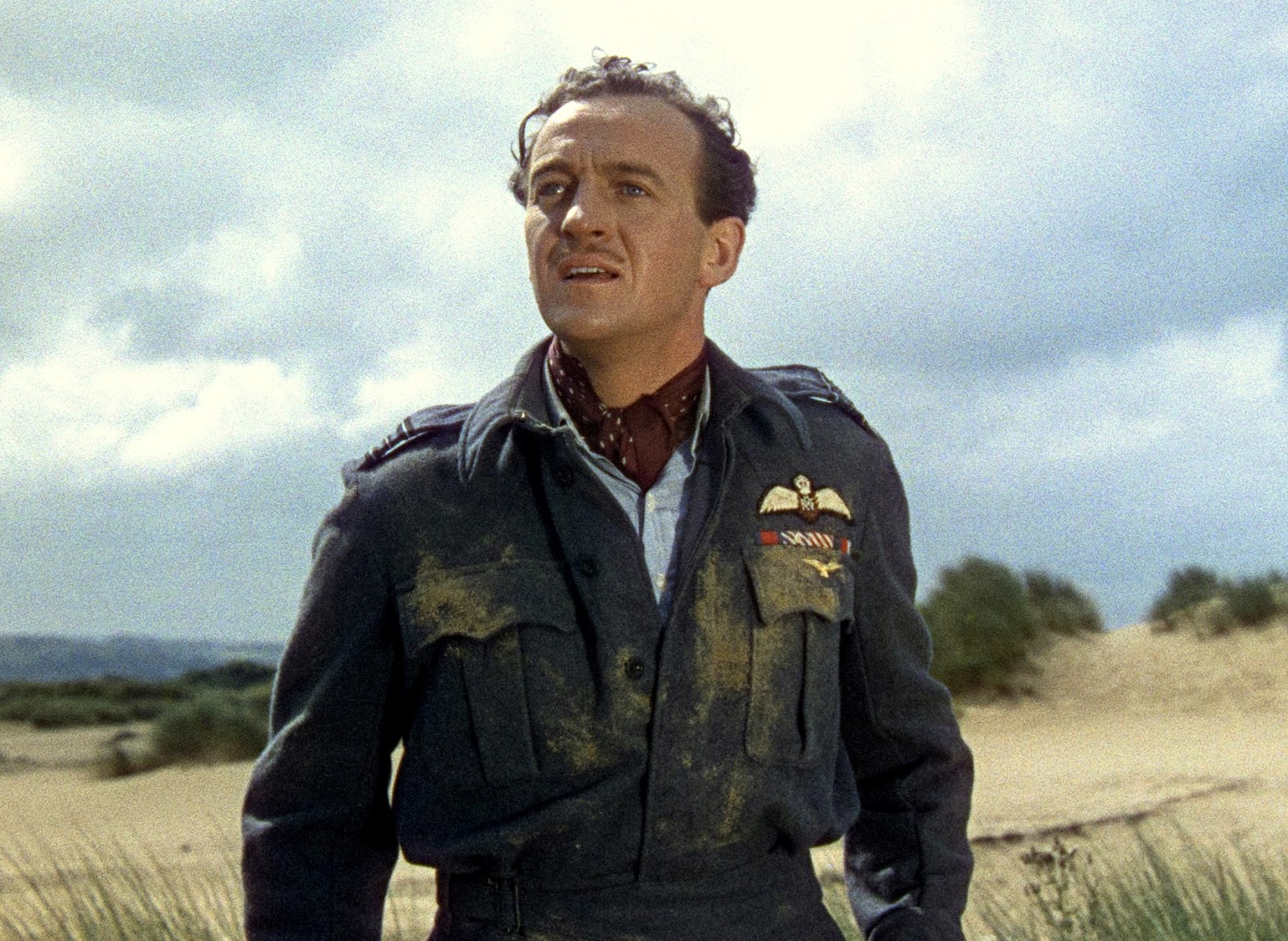Unlike so many
who made the trip to the city of stars before
and after him, Niven had no professional acting experience whatsoever, and
plunged into Hollywood at the deep end.
He signed on at the Central Casting Agency and was listed as ‘English type 2,008’. But the
other 2,007 were tough competitors, and
when at last he got a chance to take a screen test and was offered a contract, the
Immigration Department stepped in, and Niven
beat a hasty retreat on a Mexican-bound fruit train.
David Niven was always a resourceful and determined man, qualities
that admirably equipped him for the many heroic parts he played on screen. His
father was Scottish, his mother French, and he was born on 1 March 1910. After
spending most of his childhood in Scotland, he went to Stowe public school, and
then to Sandhurst, with the intention of pursuing a military career. As a young
officer in the Highland Light Infantry, he served two years in a Malta outpost,
but became excruciatingly bored with the life of a peacetime soldier. So, he
left the Army and began his search for real adventure by going to Canada,
taking up a succession of different jobs. He worked on a newspaper, helped in
bridge construction, was a waiter, a barman, and then, thinking this latter
occupation gave him the necessary know-how, became a wine salesman and took off
over the Canadian border to the USA. Once more he became disenchanted with the
wine and liquor business and branched out in a new direction. This time he was
offered a partnership in an indoor racing track in Atlantic City, but he was
soon put out of business by the local Mafia, who made such big demands for
protection that it was wiser to shut up shop.
Lucky to get out in one piece, the restless Niven took off
yet again in search of fresh fields. He followed the sun and spent most of his
time beachcombing in Bermuda and Havana, finding some extra excitement by
becoming involved in a Peruvian revolution, fighting at various times for both
sides. When the British Consul heard about his activities, Niven was given twenty
minutes to pack his bag and get out of the country.
It took him four months of nomadic wandering before he
could get back to America. When he finally did, he headed straight for
Hollywood again. Older and wiser, ‘English type 2,008’ was once again prepared
to join the queue looking for work.
At last, he got a break. Sam Goldwyn saw him and put him under contract. A
series of minor parts followed, consisting of such jewels as ‘Hello my dear’ in
one film, and ‘Goodbye, my dear’ in another, Then came Dodsworth (1936)
and a part he could really get his very white teeth into. It launched a career
which made him a household name. In 1939, when Britain declared war on Germany,
Niven decided to put his Army training to patriotic use and joined the British
forces. Whilst actively serving his country, he only agreed to make two films,
and this was because of their powerful propaganda message – The First Of The
Few (1942), and The Way Ahead (1944).
In 1946 Niven made his first film for that formidable duo, Michael Powell and Emeric
Pressburger. A Matter Of Life and Death created many precedents for the
British cinema. It tells the story of Squadron Leader Peter D. Carter (David
Niven) who is the last surviving crew member of a crippled Lancaster bomber.
Realizing he can no longer remain with his aircraft, he contacts base to reveal
his position and hopeless plight, and engages in an often deeply moving,
two-way radio conversation with a WAAF wireless operator. (Twenty-three year
old Kim Hunter was the first American actress to appear in a British film since
before the War, and had been tested by Powell and Pressburger when they were in
the States getting background material for the film.) Niven, as the crashed
pilot, is rushed into an operating theatre, and whilst his life hovers in the
balance we are taken into his mind as it drifts into a world of fantasy,
culminating in a vast courtroom trial to decide whether he should live or die.
The most imaginative and expensive sets were created to
depict the ‘other world’, including a giant staircase of 106 steps, each one
twenty feet wide. It operated like an elevator and was driven by a 12 hp
engine. The huge apparatus, which was totally functional, had been constructed
by a famous firm of engineers, and the whole process was kept a closely guarded
secret by the cast and crew, and given the code name ‘Operation Ethel’.
A Matter Of Life And Death was the first Royal Command film, and its
premiere in Leicester Square caused such a crush, with thousands turning up to
see the stars, and catch a glimpse of the King and Queen, that the police, who
were totally unprepared for such numbers, almost lost control. The Royal family
had to be rushed through into the foyer in most un-regal fashion, nearly being
trampled underfoot in the process. The King was badly shaken by the experience,
as indeed were some of the stars, whose clothes and stockings had been torn to
shreds by the excited crowds.
Niven returned to Hollywood and resumed his career there.
It continued to flourish with a series of box-office hits. In 1959, with
Deborah Kerr as his co-star in Separate Tables, Niven won an Academy
Award and the New York Critics’ Award for his outstanding performance. Later in
life, this natural, witty raconteur turned his talent to writing, and his
autobiography became an international best seller. Niven brought all the finest
attributes of the British hero to the roles that he played; a dash and charm,
liberally laced with a puckish sense of fun, that by all accounts perfectly
mirrored his real-life personality.











No comments:
Post a Comment